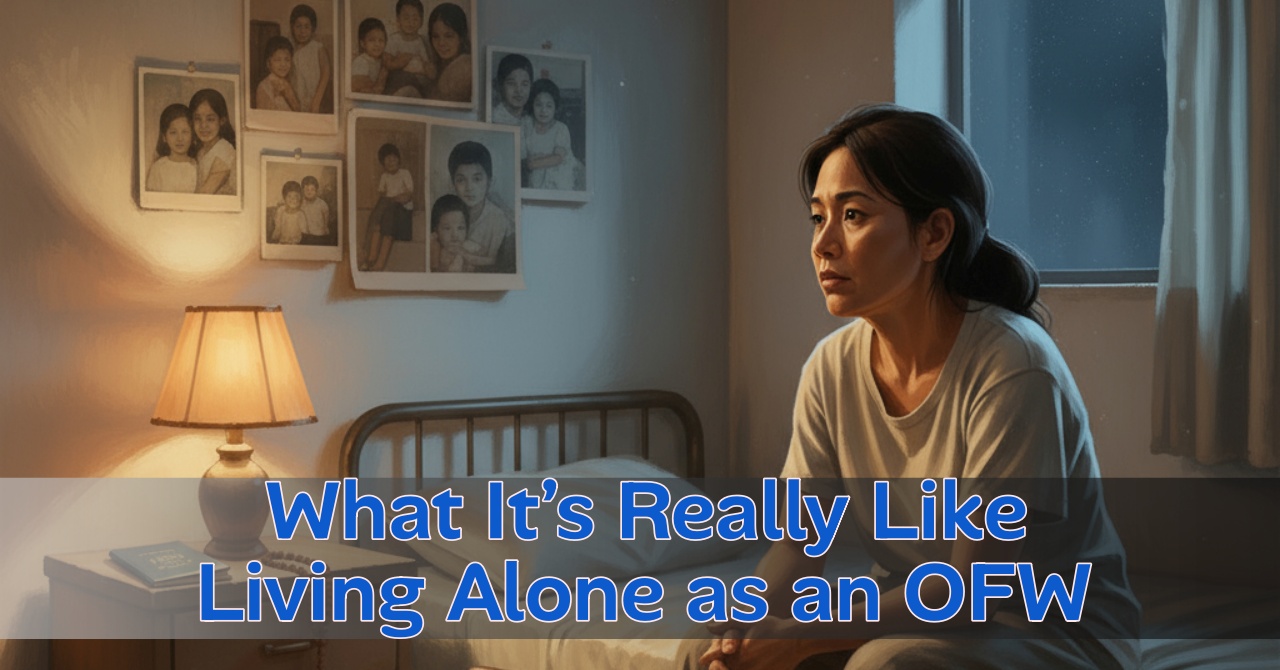When I first started living alone in Taiwan, I thought the hardest part would be managing money. I was wrong. It’s everything else that comes with silence. The quiet after work, the meals eaten alone, the small repairs I had to figure out by myself. The moments when I realized there was no one to remind me to rest or eat on time.
No one really talks about this side of working abroad—the part where you’re not just earning for your family but also learning how to live with yourself.

The Everyday Reality of Independence
People often romanticize independence. They say, “At least you’re free now.” But freedom, when you’re an OFW living alone, can sometimes feel heavy. You make every decision—what to cook, when to clean, how to spend or save, what to do when you get sick. There’s no one to share the weight of the small things that add up.
And yet, that’s where the growth happens. You learn to budget not just your salary but your energy. You start planning your groceries around your mood, your cleaning days around your shifts, and your savings around both the bills and the birthdays you’ll miss back home.
There’s a quiet pride in being able to do it all. But it doesn’t come without its toll.
The Loneliness That Lurks Between Calls
Homesickness hits hardest in the small hours—the times when you crave the noise of home, or the smell of sinigang from a neighbor’s kitchen. You scroll through family photos, join a group video call, laugh with them for a while, then hang up and face the silence again.
Living alone means learning how to manage that silence. Some OFWs create routines that mimic home life—Sunday laundry, midweek grocery trips, meals that remind them of their mom’s cooking. Others decorate their dorms with family pictures or small trinkets from the Philippines, a quiet rebellion against the emptiness of a bare room.
The truth is, loneliness doesn’t disappear. It just becomes something you learn to live with—and in a way, befriend.
Finding a New Kind of Family
If there’s one thing most OFWs will tell you, it’s that community saves you. The first time you share adobo with a fellow Filipino after a long day, it feels like finding a piece of home abroad.
Some of us find that comfort in church groups or Filipino associations. Others connect online through Facebook groups or chats, swapping advice about work, rent, or visa renewals. It’s not always perfect—but it’s something. A reminder that you’re not the only one trying to figure it all out.
And over time, friendships with locals can grow into real support systems, too. You learn each other’s languages, exchange food, and share small kindnesses that make the days lighter.
The Art of Taking Care of Yourself
One of the hardest lessons of living solo abroad is that self-care isn’t a luxury—it’s survival. You learn to eat better because no one else will tell you to. You take walks not because you have time, but because it helps you clear your head.
Some OFWs start journaling, others find peace in prayer or short workouts after work. Even simple habits—like playing music while cooking or calling home regularly—become lifelines.
When you’re far from home, taking care of yourself becomes an act of love for your family, too. Because every meal you eat, every rest you take, is what keeps you strong enough to keep going.
Lessons You Can’t Learn Any Other Way
Living alone teaches you things no training can. You learn how to fix a broken appliance with YouTube tutorials. You find the cheapest local laundry shop. You discover the difference between loneliness and solitude—and realize that solitude, once embraced, can be healing.
You also learn to say no. No to overtime that robs you of sleep. No to habits that drain your energy. No to people who mistake your kindness for weakness. That’s the kind of growth that working abroad quietly shapes—an inner strength no one sees, but everyone back home benefits from.
Practical Tips That Help
- Plan meals ahead. Cook extra and store portions for later. It saves time, money, and effort.
- Keep an emergency list. Save numbers for your embassy, local police, and hospital. You never know when you’ll need them.
- Stay connected. Join Filipino community chats, online or in person. Sharing helps lighten emotional weight.
- Set rest boundaries. Burnout sneaks up fast when you’re juggling everything alone. Protect your downtime.
- Ask for help. Whether it’s your HR, a kababayan, or a counselor, reaching out doesn’t mean you’re weak—it means you’re wise.
A Quiet Kind of Strength
Living alone as an OFW is more than a test of independence. It’s a journey of resilience. Each day, you wake up and build a small life from scratch—a life that’s messy, imperfect, but yours.
You may not always see it, but you’re growing in ways that will change you forever. You’re learning patience, courage, and a deep kind of self-trust that comes only from being your own home in a foreign place.
So if you’re reading this from your dorm room, your tiny apartment, or the breakroom after a long shift—know this: you’re not just surviving. You’re building strength no one can take away from you.
And one day, when you go home, your family won’t just welcome the provider—they’ll welcome the person who learned to stand strong on their own.
